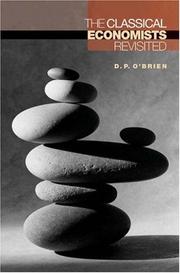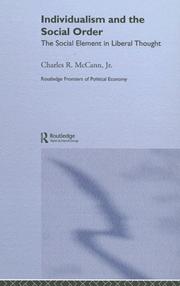| Listing 1 - 3 of 3 |
Sort by
|

ISBN: 0691119392 9780691119397 0691177988 1400888239 Year: 2004 Publisher: Princeton (N.J.) : Princeton university press,
Abstract | Keywords | Export | Availability | Bookmark
 Loading...
Loading...Choose an application
- Reference Manager
- EndNote
- RefWorks (Direct export to RefWorks)
Economic schools --- Economics --- Classical school of economics --- History --- 330 --- AA / International- internationaal --- 330.00 --- Theoretische economie. Economische theorie. Economische analyse --- Economische en sociale theorieën: algemeenheden. --- 330 Theoretische economie. Economische theorie. Economische analyse --- Economic theory --- Political economy --- Social sciences --- Economic man --- Classical economics --- Individualist school of economics --- Orthodox school of economics --- Schools of economics --- Economische en sociale theorieën: algemeenheden --- Economics - History - 19th century --- Classical school of economics - History - Sources --- Economics - History - Sources
Book
ISBN: 2130538215 Year: 2004 Volume: *23
Abstract | Keywords | Export | Availability | Bookmark
 Loading...
Loading...Choose an application
- Reference Manager
- EndNote
- RefWorks (Direct export to RefWorks)
Austrian school of economics --- Historical school of economics --- Ecole autrichienne d'économie politique --- Ecole historique d'économie politique --- Marx, Karl, --- Menger, Carl, --- #A0411HI --- AA / International- internationaal --- 330.00 --- 330.46 --- Economische en sociale theorieën: algemeenheden. --- Hedendaagse periode, met inbegrip van de psychologische school (Oostenrijkse), mathematische school, solidarisme, communisme, marxisme, bolsjewisme, anarchisme. --- Ecole autrichienne d'économie politique --- Ecole historique d'économie politique --- Classical school of economics --- Classical economics --- Individualist school of economics --- Orthodox school of economics --- Schools of economics --- Economische en sociale theorieën: algemeenheden --- Hedendaagse periode, met inbegrip van de psychologische school (Oostenrijkse), mathematische school, solidarisme, communisme, marxisme, bolsjewisme, anarchisme

ISBN: 0203488725 1280019956 1134340591 0415326273 0415655137 0203602293 0429233108 9780203488720 9780415326278 9786610019953 6610019959 9781134340590 9781134340545 1134340540 9781134340583 1134340583 9780415655132 Year: 2004 Publisher: London ; New York : Routledge,
Abstract | Keywords | Export | Availability | Bookmark
 Loading...
Loading...Choose an application
- Reference Manager
- EndNote
- RefWorks (Direct export to RefWorks)
Liberalism is typically misconceived as a philosophy of individualism, which cannot accept that man exists in society and that man's values are shaped by that society.This book attempts to identify the role of community and society in the political and social thought of leading liberal social philosophers of the 19th and 20th centuries including John Stuart Mill, Herbert Spencer and Friedrich A. von Hayek. While differing as to the nature of man and society, each thinker examined holds the basic premise that man is not an isolated creature whose life is 'nasty, brutish and short' but r
Classical school of economics. --- Individualism. --- Liberalism. --- Mill, John Stuart. --- Free enterprise. --- Social values. --- Communities. --- Mill, John Stuart, --- Spencer, Herbert, --- Hayek, Friedrich A. von --- Community --- Free markets --- Laissez-faire --- Markets, Free --- Private enterprise --- Liberal egalitarianism --- Hai-yeh-kʻo, --- Hayek, Friedrich August von, --- Hayek, F. A. von --- Haiekʻŭ, Pʻŭridŭrihi A., --- Khaĭek, F. A., --- Hayek, Frederich August von, --- Von Hayek, Friedrich A. --- Hayeke, --- 哈耶克, F.A. 冯, --- 哈葉克, --- 海耶克, --- Mil, Zhūn Istīwārt, --- Mill, Dzhon Sti︠u︡art, --- Miru, Jon S., --- Mi-erh, Yüeh-han, --- Mi-erh, Yüeh-han Ssu-tʻu-ya-tʻe, --- Mill, J. S. --- Mil, --- Mil, G'on Sṭyuʼarṭ, --- Miru, --- מילל, דושאהן סטוארט --- מילל, דזשאהן סטוארט --- מיל, ג׳ון סטיוארט --- מיל, ג׳ון סטיוארט בן י׳מס, --- מיל, ג'ון סטיוארט, --- ميل، جون ستيوارت،, --- ミルジヨンスチユアート, --- 彌爾, --- 穆勒, --- Mil, Džon Stjuart, --- Social groups --- Values --- Economic policy --- Economics --- Equality --- Political science --- Self-interest --- Sociology --- Libertarianism --- Personalism --- Persons --- Liberty --- Social sciences --- 穆勒
| Listing 1 - 3 of 3 |
Sort by
|

 Search
Search Feedback
Feedback About UniCat
About UniCat  Help
Help News
News